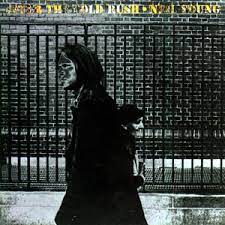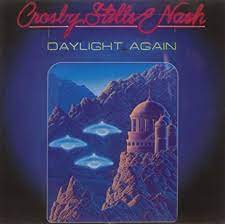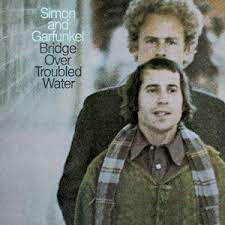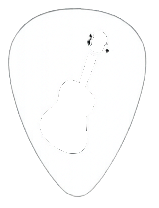Gordon Lightfoot Most Popular Songs
On The Acoustic
Here on my Gordon Lightfoot most popular songs page where you'll find a collection of demo covers, free pdf chord sheets, rhythm tips and more. If you require full lesson tutorials, they are also available for a small fee from the discount codes on the homepage.

Alberta Bound
Bitter Green
Black Day In July
Carefree Highway
Christian Island
Cotton Jenny
Did She Mention My Name
Don Quixote
Early Morning Rain
For Loving Me - Did She Mention ...
Go Go Round
Hangdog Hotel Room
If You Could Read My Mind
In My Fashion
Race Among The Ruin
Rainy Day People
Ribbon Of Darkness
Second Cup Of Coffee
Song For A Winters Night
Steel Rail Blues
Summer Side Of Life
Summertime Dream
Sundown
The First Time Ever I Saw Your Face
The Watchman's Gone
The Wreck Of The Edmund Fitzgerald
You Are What I Am
Gordon Lightfoot Most Popular Songs
Pdf's, Chords, Demos, Tutorials
14 Karat Gold - Learn To Play On Guitar
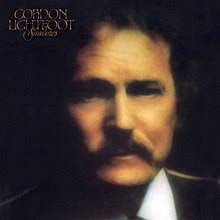
14 Karat Gold is a folk-pop ballad written and performed by Gordon Lightfoot. It was released in 1982 as the opening track of his album "Shadows." The song showcases Lightfoot's signature storytelling style and heartfelt lyrics.
The lyrics of "14 Karat Gold" reflect on the transience and fragility of love and the desire for a lasting connection. Lightfoot compares the beauty and value of love to precious materials, such as gold, implying that true love is rare and valuable.
Musically, the song features Lightfoot's soothing vocals accompanied by acoustic guitar, soft piano, and subtle orchestration. It has a gentle, melodic quality that complements the introspective nature of the lyrics.
While "14 Karat Gold" may not be as widely recognized as some of Lightfoot's other hits, it is a reflective and poignant track that showcases his songwriting prowess and his ability to evoke emotion through his music. The song was never released as a single.
Chords And Strumming
I play a capo 2nd fret in standard tuning here with a down down up down up down up and repeat rhythm pattern. No lead with the chords G/A, A, E, C, D, Am, E7, F, Dm and a G.
Guitar Lesson Details - (chords & lyrics sheet incl with lesson)
Chords & LyricsJump To Top
Alberta Bound - Learn To Play On Guitar
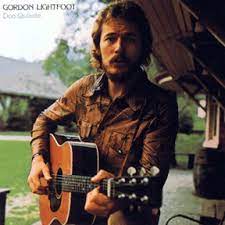
Alberta Bound is
one of Gordon Lightfoot's most popular and beloved songs. It was
released in 1972 as part of his album "Don Quixote" but the song failed
to chart.
"Alberta Bound" is a folk-rock song that pays tribute to the province of Alberta in Canada. The song reflects Lightfoot's love for the region and captures the spirit of the Canadian West. It has become an unofficial anthem for Alberta and is often associated with Canadian pride and nostalgia.
Lyrically, "Alberta Bound" paints a picture of the beauty and allure of Alberta's landscapes, its open spaces, and the sense of freedom it represents. The song speaks to the idea of returning to a place that holds a special significance in one's heart.
Chords And Strumming
I play a drop D tuning here with a capo 2nd fret and a root down up down up down up and repeat rhythm pattern. Some lead required with the chords D, G and A7.
Guitar Lesson Details - (chords & lyrics sheet incl with lesson)
Chords & LyricsJump To Top
Bitter Green - Learn To Play On Guitar
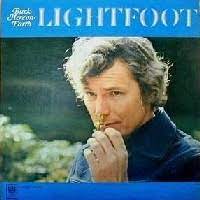
Bitter Green is a folk-inspired ballad that showcases Lightfoot's storytelling abilities and lyrical prowess. The song explores themes of love, loss, and the passage of time. It tells the story of a young woman named Bitter Green, who is described as having a captivating and mysterious presence.
The lyrics of "Bitter Green" evoke a sense of longing and melancholy as Lightfoot reflects on the passing of time and the fleeting nature of beauty. The song paints a vivid picture of the protagonist's journey through life, using nature imagery and metaphors to convey the emotions and experiences.
Musically, "Bitter Green" features Lightfoot's signature fingerpicking style on the acoustic guitar, accompanied by subtle orchestration that enhances the emotional impact of the song. Lightfoot's warm and distinctive vocals further contribute to the song's evocative atmosphere.
While "Bitter Green" may not have achieved the same level of commercial success as some of Lightfoot's other hits, it is highly regarded among fans and showcases his talent for crafting poignant and introspective songs. The song reached #44 on the Canadian charts.
Chords And Strumming
This number I play in drop D tuning with a capo 3rd fret. For rhythm you can play root down up down up down up and repeat with no lead required. For chords you'll play an A6, A, D, D/Gb, G, A7, F and an E.
Guitar Lesson Details - (chords & lyrics sheet incl with lesson)
Chords & Lyrics
Jump To Top
Black Day In July - Learn To Play On Guitar
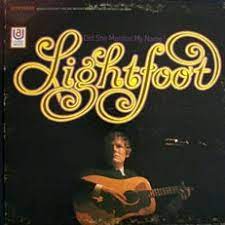
Black Day In July is a song written and performed by Gordon Lightfoot. It was released in 1968 as a single and later included on his album "Did She Mention My Name?" The song is notable for its powerful and haunting depiction of the Detroit riot that took place on July 23, 1967. Here's some information about the song:
"Black Day in July" is a protest song that addresses the racially charged and violent events of the Detroit riot. The riot, which lasted for five days, was a response to longstanding racial tensions and inequalities in the city. The song aims to shed light on the social and political issues surrounding the event.
The song provides a vivid narrative of the riot, capturing the chaos, fear, and tragedy that unfolded during that period. Lightfoot's lyrics paint a harrowing picture of the violence and the impact it had on the community.
Musically, the song combines elements of folk and rock, featuring Lightfoot's acoustic guitar accompanied by electric guitar, drums, and bass. The driving rhythm and intense instrumentation serve to underscore the gravity of the subject matter.
"Black Day in July" became a controversial song due to its explicit commentary on the racial tensions and the government's response to the riot. It was banned from some radio stations at the time due to its politically charged content.
Chords And Strumming
Played in standard tuning with a capo 2nd fret and no picking required. For rhythm play a root down up down up down up and repeat with the chords Em, D, G, C, Em/C# and an Em/C.
Guitar Lesson Details - (chords & lyrics sheet incl with lesson)
Chords & LyricsJump To Top Of Gordon Lightfoot Most Popular Songs
Carefree Highway
- Learn To Play On Guitar
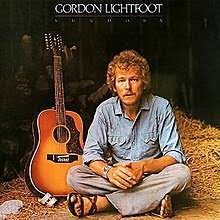
"Carefree Highway" is a song created by Gordon Lightfoot and was the second single from his 1974 album, Sundown. This tune reached No. 10 on the Billboard Hot 100 and held the top spot on the Easy Listening chart for one week in October 1974.
The title of the song comes from a part of Arizona State Route 74 in north Phoenix. Lightfoot shared, "I thought it would make a good title for a song. I wrote it down, put it in my suitcase and it stayed there for eight months."
In the song, "Carefree Highway" is like a way of thinking where the singer wants to escape from thinking too much about a past relationship with a woman named Ann. Lightfoot revealed that Ann was the name of a woman he dated when he was 22 years old, describing it as one of those situations where you meet someone special who leaves a lasting impression and then says she's moving on.
Chords And Strumming
For rhythm in this number play a down down up down up down up and repeat with a little picking in the rhythm. I play a capo 2nd fret with the chords D, C, G, A7sus, A7, Gb, Bm, Bm/A, E7sus and an E7.
Guitar Lesson Details - (chords & lyrics sheet incl with lesson)
Chords & LyricsFull tutorial and demo lesson avail for $3.25
Jump To Top
Christian Island - Learn To Play On Guitar
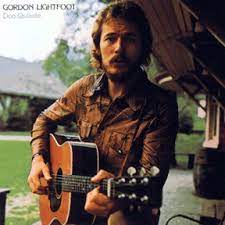
Christian Island is a track from the album "Don Quixote" from1972.
The song was never released as a single.
Chords And Strumming
Play a 1-2-3- up down up (with 1-2-3 arpeggio being notes in the chord) in standard tuning. The chord G, C and D required here with no lead but a few riffs.
Guitar Lesson Details - (chords & lyrics sheet incl with lesson)
Chords & LyricsJump To Top
Cotton Jenny - Learn To Play On Guitar
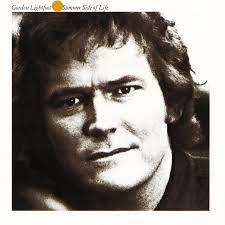
Cotton Jenny can be found on Lightfoot's 1971 album "Summer Side Of Life". Anne Murray later recorded the song and made it a #1 hit in Canada and #11 in the US.
Lightfoot never released the song as a single.
Chords And Strumming
The chords in this song are G, C/G, C, D, D7 and an A7 with no picking. Played in standard tuning with a root down up down up down up for rhythm.
Chords & LyricsJump To Top
Did She Mention My Name - Learn To Play On Guitar
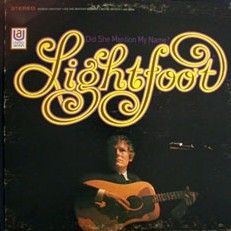
Did She Mention My Name is not only the name of this song, but also the name of the 1968 album released by Gordon Lightfoot.
The song Black Day In July was the only single released from this album.
Chords And Strumming
Play this one in standard tuning with a root down up down up down up rhythm pattern. Some lead required with the chords G, C, D, D7, Em and an A7.
Guitar Lesson Details - (chords & lyrics sheet incl with lesson)
Chords & LyricsJump To Top Of Gordon Lightfoot Most Popular Songs
Don Quixote - Learn To Play On Guitar
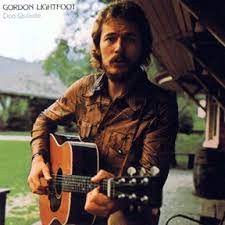
Don Quixote is a track from the 1972 album of the same name. The song is about a book written in the 1600's with a fictional character with the name Don Quixote.
This song was never released as a single.
Chords And Strumming
I play a capo 4th fret here with a root down up root up down up and repeat rhythm pattern in standard tuning with a few picking riffs. The chords here are G, C, D and a C/G.
Guitar Lesson Details - (chords & lyrics sheet incl with lesson)
Chords & LyricsJump To Top Of Gordon Lightfoot Most Popular Songs
Early Morning Rain
- Learn To Play On Guitar
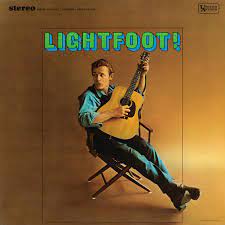
Early Morning Rain is a very popular song from Lightfoot's 1965 debut album "Lightfoot" but was not chosen as a single. Ribbon Of Darkness was chosen instead.
It was re-recorded for the "Gord's Gold" album in1975. The song was written on a Rainy Day at the LA International Airport. Many artists have recorded this song including Elvis, Bob Dylan
and even Jerry Lee Lewis.
Chords And Strumming
Another one here in standard tuning with a capo 2nd fret while playing a steady down up down up shuffle pattern. No lead required with the chords D, G and an A.
Guitar Lesson Details - (chords & lyrics sheet incl with lesson)
Chords & LyricsJump To Top
For Lovin Me - Did She Mention My Name - Learn To Play On Guitar
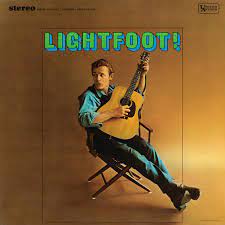
For Lovin Me - Did She Mention My Name is a combo that Lightfoot starting doing in concerts. But the first song, For Loving Me is from his debut 1965 album "Lightfoot".
But it was never released as a single. Did She Mention My Name is from the 1967 album of the same name.
Chords And Strumming
I play a capo 2nd fret with the chords E, G, D, C, Em, A7 and a D7 in standard tuning. Some lead in this one with a root down up down up down up rhythm pattern.
Guitar Lesson Details - (chords & lyrics sheet incl with lesson)
Chords & LyricsJump To Top
Go Go Round
- Learn To Play On Guitar
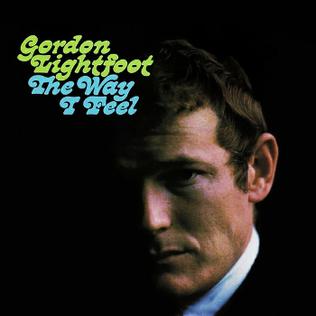
Go Go Round was one of several singles from Lightfoot's 1967 album The Way I Feel. The song did well reaching #27 on the charts.
Chords And Strumming
I play a G with a G/E, Am, D and a Dsus in standard tuning. Some lead required as you play a root down up down up down up and repeat rhythm pattern.
Guitar Lesson Details - (chords & lyrics sheet incl with lesson)
Chords & LyricsJump To Top
Hangdog Hotel Room - Learn To Play On Guitar
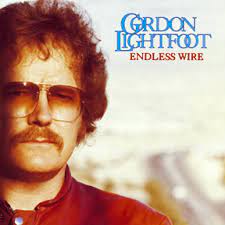
Hangdog Hotel Room is a track from Lightfoot's 1978 album "Endless Wire" and has a rock n roll vibe to it which is a bit of a departure from his normal style.
The song was never released as a single.
Chords And Strumming
For rhythm here play a down up down up like a steady rock n roll rhythm pattern in standard tuning with some lead. The chords here are A, B, D, E and a G.
Guitar Lesson Details - (chords & lyrics sheet incl with lesson)
Chords & LyricsJump To Top
If You Could Read My Mind - Learn To Play On Guitar
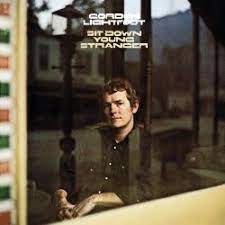
If You Could Read My Mind was the first #1 for Gordon Lightfoot in Canada and in the US when it was released in 1970.
The track can be found on the album, "Sit Down Young Stranger". The song inspiration came about from a divorce Lightfoot was going through at the time.
Chords And Strumming
Play this one in standard tuning and a capo 2nd fret with a 1-2-3- up down up (with 1-2-3 being notes in the chord) rhythm pattern. Some picking required with the chords G, Fmaj7, G7, C, D, Em, G6, and an Am7.
Guitar Lesson Details - (chords & lyrics sheet incl with lesson)
Chords & LyricsJump To Top Of Gordon Lightfoot Most Popular Songs
In My Fashion - Learn To Play On Guitar
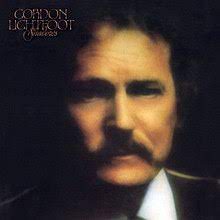
In My Fashion is a track from the 1982 album "Shadows".
The song was never released as a single.
Chords And Strumming
Played with a capo 2nd fret in standard tuning with a down down up down up down - down up down up down up and repeat rhythm pattern. Some riffs in the pattern with the chords E, Esus and a B/E.
Guitar Lesson Details - (chords & lyrics sheet incl with lesson)
Chords & LyricsJump To Top
Race Among The Ruins - Learn To Play On Guitar
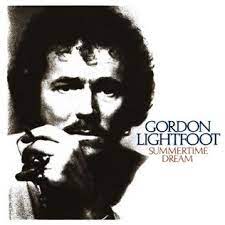
Race Among The Ruins was from the Summertime Dream album of 1976.
The song peaked as high as #11 in Canada and reached # 13 in the US.
Chords And Strumming
A few picking riffs in this one and played with a capo 2nd fret in standard tuning. Play a down down up and repeat rhythm pattern with the chords D, A, G and an F.
Guitar Lesson Details - (chords & lyrics sheet incl with lesson)
Chords & LyricsJump To Top
Rainy Day People - Learn To Play On Guitar
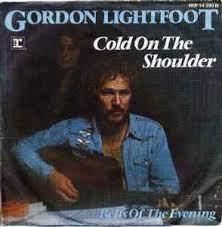
Rainy Day People was released in 1975 and was the only single from the album "Cold On The Shoulder".
The song peaked at #1 in both Canada and the US.
Chords And Strumming
I play a capo 4th here in standard tuning with a root down up root up down up repeat rhythm pattern. Some lead required with a D, G, C and an Am.
Guitar Lesson Details - (chords & lyrics sheet incl with lesson)
Chords & LyricsJump To Top
Ribbon Of Darkness - Learn To Play On Guitar
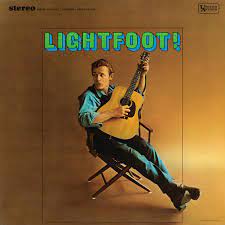
Ribbon Of Darkness was a single release back in 1965 from the album "Lightfoot". But his version did not chart. However, Marty Robbins released the single the same year and had a #1 country hits.
Connie Smith, Crystal Gayle and Bruce Cockburn have all done covers on the song.
Chords And Strumming
- Drop D Tuning: No
- Capo: No
- Rhythm: root down up down up down up
- Picking: Yes
- Chords: G, C, D, Am, D7
Guitar Lesson Details - (chords & lyrics sheet incl with lesson)
Chords & LyricsJump To Top Of Gordon Lightfoot Most Popular Songs
Second Cup Of Coffee - Learn To Play On Guitar
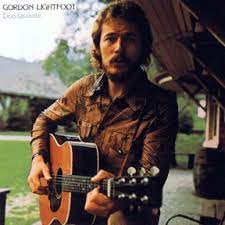
Second Cup Of Coffee hails from the "Don Quixote" album from 1972.
This one was never released as a single.
Chords And Strumming
A great tune I play in drop D tuning with a capo 2nd fret. Some lead blended into the rhythm with a root down up down up down up rhythm pattern and the chords D, G, A7, A/Db, and Em.
Guitar Lesson Details - (chords & lyrics sheet incl with lesson)
Chords & LyricsJump To Top
Song For A Winters Night - Learn To Play On Guitar
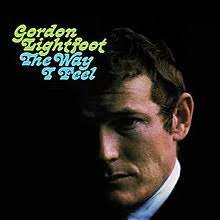
Song For A Winters Night hails from the 1967 album "The Way I Feel". The song was actually written in the summertime heat of Cleveland Ohio in 1967.
The song was never released as a single but was re-recorded for the late album "Gord's Gold" in 1975.
Chords And Strumming
The chords here are G, F, C, D/Gb, Em, Bm, Am, D and a B7 with a capo 2nd fret in standard tuning. For rhythm play a root down up down up down up and repeat pattern with a few riffs in the rhythm.
Guitar Lesson Details - (chords & lyrics sheet incl with lesson)
Chords & LyricsJump To Top
Steel Rail Blues
- Learn To Play On Guitar
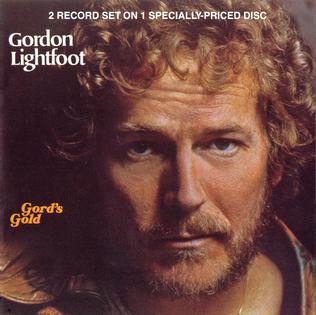
Steel Rain Blues is a track on the 1975 album Gords Gold, which was a compilation of many of great songs up until that point.
This song, like a few others, were recorded for this album as Lightfoot wasn't satisfied with the sound quality on some of these earlier recordings.
Chords And Strumming
Soon.
Guitar Lesson Details - (chords & lyrics sheet incl with lesson)
Chords & LyricsJump To Top
Summer Side Of Life - Learn To Play On Guitar
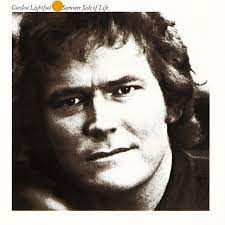
Summer Side Of Life broke into the US charts at #98 back in 1971 and comes from the album of the same name.
In Canada the song peaked at #21 on one chart and #4 on another.
Chords And Strumming
Played with a capo 2nd fret with a C, F, G, Esus, Am and an E, some lead required. Play a down down up down up down up down up down up down up down up and repeat rhythm pattern in standard tuning.
Guitar Lesson Details - (chords & lyrics sheet incl with lesson)
Chords & LyricsJump To Top
Summertime Dream - Learn To Play On Guitar
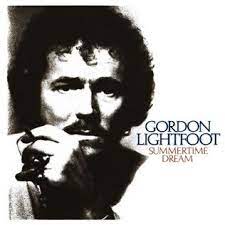
Summertime Dream is a track from the 1976 album of the same name.
The song was never released as a single.
Chords And Strumming
For chords here you'll play a D, A, G, A7, Bm, A7sus and with some lead in standard tuning. For rhythm play a root down root up down up and repeat pattern.
Guitar Lesson Details - (chords & lyrics sheet incl with lesson)
Chords & LyricsJump To Top Of Gordon Lightfoot Most Popular Songs
Sundown - Learn To Play On Guitar
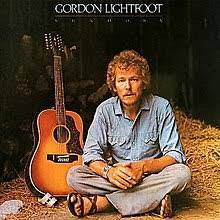
Sundown was Lightfoot's 2nd #1 song in the US and his only #1 on the US Hot 100 chart. The song was also a #1 in Canada, hit the US Country charts at #13 and reached a #4 in Australia.
The song is from the album of the same name. The song has been covered by Tony Keith, Jesse Winchester and Nana Mouskouri.
Chords And Strumming
I play a capo 2nd fret on this number in standard tuning and with some lead required. For rhythm you'll need a root up down up and repeat pattern with the chords E, B7, A and a D.
Guitar Lesson Details - (chords & lyrics sheet incl with lesson)
Chords & LyricsJump To Top
The First Time Ever I Saw Your Face - Learn To Play On Guitar
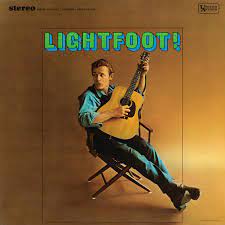
The First Time Ever I Saw Your Face was a huge hit for Roberta Flack in 1972, but years earlier, folk artists began playing this song that dates back to 1957.
And many of those earlier versions sound nothing like the 1972 hit. And that includes Lightfoot's version here from his debut 1965 album "Lightfoot".
Chords And Strumming
The chords in this one are D, A, Gbm, Em, G, C and an A7 and played with a capo 4th fret. Play a 1-2 up root down up down up and repeat (where 1-2 are notes in the chord) for rhythm and some lead.
Guitar Lesson Details - (chords & lyrics sheet incl with lesson)
Chords & LyricsJump To Top
The Watchman's Gone - Learn To Play On Guitar
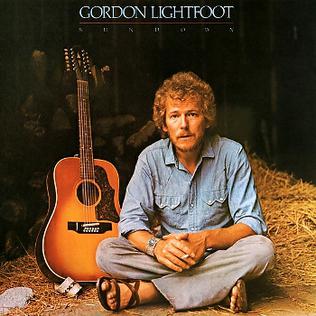
The Watchman's Gone is a track from Lightfoot's 1974 album Sundown. This track was never released as a single.
Chords And Strumming
I play this one with a capo 2nd fret with the chords G, C, D, F, C/G and an Em and in standard tuning. A little picking involved with a down down up down up down up rhythm pattern.
Guitar Lesson Details - (chords & lyrics sheet incl with lesson)
Chords & LyricsJump To Top
The Wreck Of The Edmund Fitzgerald - Learn To Play On Guitar
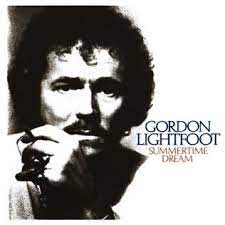
The Wreck Of The Edmund Fitzgerald is a great song about the sinking of the Edmund Fitzgerald. The song reached #1 in Canada and #2 in the US and hit #40 in the UK.
The song can be found on the "Summertime Dream" album from 1976.
Chords And Strumming
A great classic with some lead blended into the rhythm which is a down down up down up and repeat pattern with a capo 2nd fret and in standard tuning. The chords here are Asus2, Em, G and a D.
Guitar Lesson Details - (chords & lyrics sheet incl with lesson)
Chords & LyricsJump To Top
You are What I Am - Learn To Play On Guitar
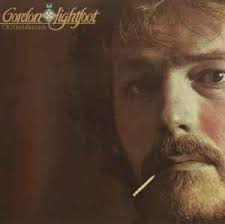
You Are What I Am was a single release from the 1972 album "Old Dan's Records". The song was a #1 in Canada and a #32 in the US.
The song also charted in Australia at #37.
Chords And Strumming
Play a root down root up down up rhythm pattern and I play a capo 2nd fret. Some lead needed with the chords Gb, G, Ab, A, C, D, G, D7, E7 and an A7.
Guitar Lesson Details - (chords & lyrics sheet incl with lesson)
Chords & LyricsJump To Top Of Gordon Lightfoot Most Popular Songs
Thank you for stopping by my Gordon Lightfoot most popular songs page. I hope the info found here was helpful to you.
If you liked this Gordon Lightfoot page you might also like ... (click images)
Gordon Lightfoot Crafting Greatness
Fun Folk Songs To Sing
